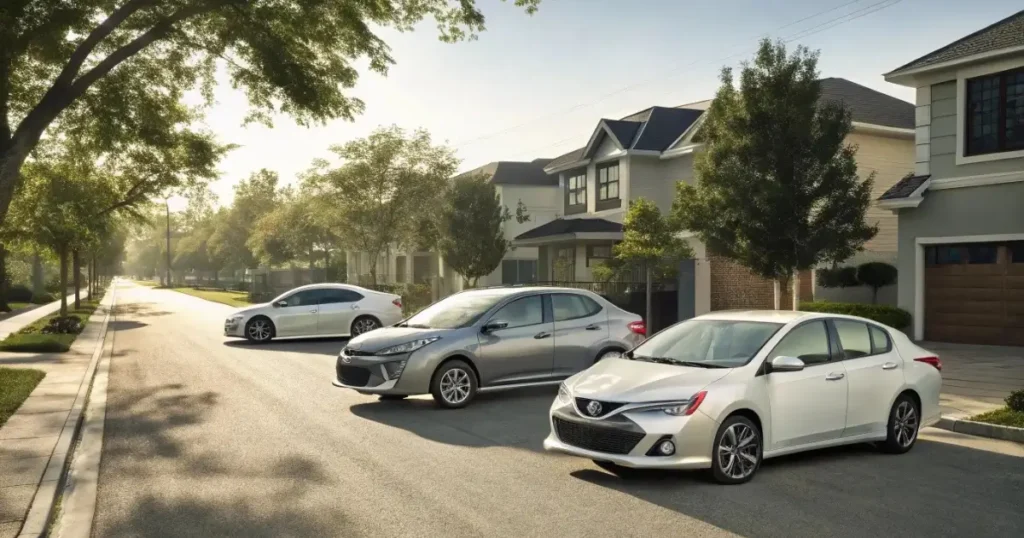Why Low Maintenance Cars Matter
Let’s face it—car repairs can be a real wallet-drainer. Whether it’s unexpected engine trouble or those “small” maintenance bills that add up over time, owning a vehicle can quickly turn into a financial headache. That’s why choosing a car that’s low maintenance is more than just a smart move—it’s peace of mind on wheels.
What Makes a Car Truly Low Maintenance?
A car isn’t low maintenance just because it rarely breaks down (though that’s a big part of it). The most dependable cars are those that offer long-term value by minimizing the time, money, and stress spent in the repair shop.
Here’s what typically defines a low-maintenance car:
- High Reliability Ratings: Vehicles with strong track records for durability from sources like Consumer Reports or J.D. Power.
- Affordable Replacement Parts: The easier it is to find inexpensive parts, the cheaper the repairs.
- Low Repair Frequency: Some cars just don’t need the shop that often—simple as that.
- Fuel Efficiency: More miles per gallon means fewer trips to the pump, saving you money in the long run.
- Extended Warranties: Brands like Kia and Hyundai offer generous coverage that cuts down your out-of-pocket costs.
- Solid Resale Value: When a car holds its worth, it helps offset the overall cost of ownership.
Choosing a car with these traits means fewer breakdowns, less worry, and more time enjoying the open road.
Key Factors That Define a Low Maintenance Car
Before jumping into the list of top picks, let’s break down the essential traits you should look for. Think of this section as your personal checklist—because not all “reliable” cars are created equal.

Reliability & Longevity
Cars like the Toyota Corolla and Honda Civic are legendary for a reason—they go the distance with fewer issues. Look for models that consistently rank high in reliability reports.
Ease of Repairs
- Are parts widely available?
- Do mechanics charge less because the repairs are straightforward?
Cars with simpler engines and fewer high-tech components are often easier (and cheaper) to fix.
Fuel Efficiency
A low-maintenance car that guzzles gas defeats the purpose. Models like the Toyota Prius and Mazda3 combine mechanical reliability with excellent fuel economy, lowering your total cost of ownership.
Warranty Coverage
Some automakers back their cars with industry-leading warranties—think Hyundai and Kia, both offering up to 10 years of coverage. This not only reduces costs but also gives peace of mind.
Repair and Maintenance Data
Resources like RepairPal and J.D. Power can help you research:
- Average annual repair costs
- Frequency of unplanned repairs
- Common issues by make and model
Pro Tip: If you’re buying used, opt for certified pre-owned (CPO) vehicles. They’re usually inspected, come with a warranty, and have a verified maintenance history—making them a safer bet for low-maintenance ownership.
Top 8 Cars That Are Low Maintenance in 2025
If you’re looking to avoid unexpected repair bills and constant trips to the mechanic, choosing the right car from the start can save you thousands. Below, we’ve rounded up eight of the best cars that are low maintenance, based on reliability, cost of ownership, fuel economy, and real-world performance

1. Toyota Corolla
The Corolla is a poster child for reliability. It’s not flashy, but it’s incredibly dependable and cheap to maintain.
Why It Stands Out:
- Consistently ranks high in Consumer Reports and J.D. Power reliability scores
- Low-cost replacement parts and affordable labor
- Impressive fuel economy (up to 40 MPG highway)
Average Annual Maintenance Cost: Around $350
Best For: Daily commuters and first-time buyers
2. Honda Civic
The Civic blends style, efficiency, and durability—making it a favorite for drivers who want a little personality without high upkeep.
Why It Stands Out:
- Strong resale value
- Engines built for long life—some last well beyond 200,000 miles
- Widely available parts and trusted by mechanics everywhere
Average Annual Maintenance Cost: Around $368
Best For: Young drivers, families, and city dwellers
3. Mazda3
If you want something a bit sportier without giving up reliability, the Mazda3 delivers both performance and peace of mind.
Why It Stands Out:
- Excellent build quality
- Simple, efficient powertrains mean fewer issues
- Great fuel efficiency with premium feel
Average Annual Maintenance Cost: Around $433
Best For: Drivers who value design and driving enjoyment
4. Hyundai Elantra
The Elantra has come a long way in recent years, offering modern tech and outstanding value—backed by one of the best warranties in the industry.
Why It Stands Out:
- 10-year/100,000-mile powertrain warranty
- Low repair frequency
- Great fuel economy and smooth ride
Average Annual Maintenance Cost: Around $452
Best For: Budget-conscious buyers who want new-car peace of mind
5. Subaru Impreza
With standard all-wheel drive and solid build quality, the Impreza is great for those in snowier climates or anyone who values stability and traction.
Why It Stands Out:
- AWD system with minimal extra maintenance
- High safety scores
- Strong resale value
Average Annual Maintenance Cost: Around $480
Best For: Outdoor enthusiasts and winter drivers
6. Kia Forte
Kia has made serious gains in reliability, and the Forte proves that affordable doesn’t mean cutting corners.
Why It Stands Out:
- Backed by a class-leading warranty
- Simple, efficient engine reduces potential issues
- High-tech features at a low price
Average Annual Maintenance Cost: Around $451
Best For: Tech-savvy drivers on a tight budget
7. Nissan Versa
If affordability is your top priority, the Versa delivers dependable transportation with very few headaches.
Why It Stands Out:
- One of the cheapest cars to own and maintain
- Basic, but extremely efficient
- Reliable performance for city driving
Average Annual Maintenance Cost: Around $330
Best For: Students, rideshare drivers, or budget-focused commuters
8. Toyota Prius (Bonus Pick for Hybrid Fans)
Think hybrids are expensive to maintain? Think again. The Prius is known for both longevity and fuel savings, making it a smart long-term investment.
Why It Stands Out:
- Proven hybrid technology with low failure rates
- Up to 58 MPG city—huge gas savings
- Consistently tops long-term reliability charts
Average Annual Maintenance Cost: Around $408
Best For: Eco-conscious drivers and high-mileage commuters
Final Takeaway: Every car on this list blends low upkeep, solid fuel economy, and long-term dependability—qualities that will save you money and reduce stress over time. Whether you’re buying new or used, sticking with proven models like these ensures your focus stays on the road—not in the repair shop.
How to Choose the Right Low Maintenance Car for You
Now that you’ve seen the top contenders, the big question is: Which one is right for you? Choosing the perfect low maintenance car depends on more than just numbers. Your lifestyle, budget, and driving habits all play a role in picking a vehicle that truly fits.
Here’s how to make the best decision for you:
Think About Your Driving Routine
Are you mostly commuting in the city, hitting the highway daily, or navigating snowy backroads?
- City driving: Go for compact, fuel-efficient models like the Nissan Versa or Hyundai Elantra.
- Highway commuters: Look for comfort and MPG, such as the Toyota Prius or Honda Civic.
- Rural or snowy areas: AWD models like the Subaru Impreza offer extra grip and confidence.
Set a Realistic Budget
Don’t just consider the sticker price. A good low maintenance car should save you money long after the purchase.
Factor in:
- Fuel costs
- Insurance premiums
- Routine service fees
- Expected repair costs (check sites like RepairPal for estimates)
New or Certified Pre-Owned (CPO)?
- New cars offer better warranties and the latest features, but cost more upfront.
- CPO cars have been inspected and often include warranty extensions, offering great value with lower depreciation.
Research Real-World Ownership Experiences
It’s one thing to read specs—but reviews from actual drivers can tell you:
- What breaks (and how often)
- What maintenance costs really look like
- How comfortable and practical the car is day to day
Check forums, Reddit threads, and consumer review sites before making a final decision.
Expert Tips to Reduce Maintenance Costs Even Further
Even the most reliable car needs regular care to stay in top shape. Luckily, a few smart habits can dramatically lower your car maintenance costs and extend the life of your vehicle.
1. Stick to the Service Schedule
It might feel easy to delay an oil change, but skipping maintenance can lead to bigger (and pricier) issues down the road.
- Follow your car’s manufacturer-recommended service intervals.
- Don’t ignore “minor” things like tire rotations or brake inspections—they prevent major wear.
2. Use Quality Parts and Fluids
Cheaping out on low-grade oil or off-brand filters may save a few bucks now, but it can shorten the lifespan of key components.
- Use OEM (original equipment manufacturer) parts when possible.
- Look for certified mechanics who understand your car’s needs.
3. Monitor Warning Signs Early
Get in the habit of checking:
- Unusual sounds or vibrations
- Dashboard warning lights
- Drops in fuel efficiency
Catching small problems early can save you hundreds later.
4. Don’t Neglect Your Car’s Exterior
Washing and waxing may seem cosmetic, but it protects against rust, especially if you live in salty or snowy environments.
Conclusion – Smart Choices Lead to Long-Term Savings
Choosing a car that’s low maintenance isn’t just about avoiding the mechanic—it’s about peace of mind, smart budgeting, and keeping life simple. Whether you’re drawn to the bulletproof Toyota Corolla, the tech-forward Kia Forte, or the eco-friendly Prius, you now have a clear roadmap to making a confident choice.
FAQS
What is the lowest maintenance car?
The Toyota Corolla consistently earns the top spot as the lowest maintenance car. It’s known for its simplicity, bulletproof engine, and low repair frequency. With average annual upkeep costs under $400, the Corolla is a favorite among mechanics and budget-conscious drivers alike.
Which car brand has the lowest maintenance?
Toyota holds the crown here too. Across the board, Toyota models rank high for long-term reliability and minimal repair needs. Other brands with low maintenance costs include:
- Honda – especially the Civic and CR-V
- Mazda – praised for quality engineering and durability
- Hyundai/Kia – newer models offer strong warranties and fewer issues than ever before
What is the #1 most reliable car?
The Toyota Prius is often rated the most reliable car overall, thanks to its proven hybrid system, minimal breakdowns, and excellent build quality. It routinely appears at the top of rankings from Consumer Reports, J.D. Power, and RepairPal.
Which car is the cheapest to service?
The Nissan Versa is one of the cheapest cars to service annually, with maintenance costs often under $330 per year. It’s a basic, no-frills compact car that excels in affordability, fuel economy, and ease of upkeep—making it ideal for students, city drivers, or anyone on a tight budget.

